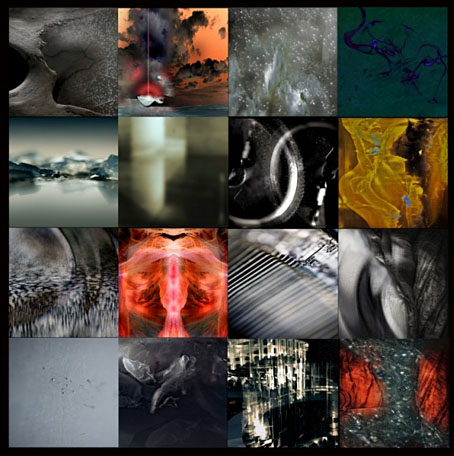One of the drawbacks with recommending Paul Schütze‘s music lately has been a lack of availability, with most of his CDs being out of print. That changes this month with his back catalogue returning via iTunes sporting a range of impressive new artwork (above) created by Mr Schütze himself.
Schütze’s electronic music stood out for me in the mid-Nineties for a number of reasons: firstly, and most obviously, it wasn’t always tied to the rigid metronomic pulse which governed the rest of the dance world. There were 4/4 beats at times—and he even had an album on Belgian dance label Apollo under the anagrammatical pseudonym Uzect Plausch—but his music was equally subject to unusual time-signatures with chiming timbres borrowed from gamelan orchestras.
Those timbres and their attendant tropical atmospheres were a second point of distinction. Like Jon Hassell, to whom he pays homage on Stateless (1997), there’s an acknowledgement of non-Western music without any falling into pastiche. This realises one aspect of Hassell’s Fourth World concept, whereby a meeting of the First World and the Third World creates an exclusive temporary zone that nonetheless can’t exist without the contribution of either party.
A third distinction would require a detailing of Schütze’s notable collaborators—Bill Laswell and Raoul Björkenheim among them—and his inventive track titles, many of which sound like Surrealist paintings. But describing music is always a poor thing compared to experiencing it. If you want a place to start, I’d recommend New Maps of Hell II: The Rapture of Metals (1993; reissued 1996) or Abysmal Evenings (1996), two constant favourites.
Previously on { feuilleton }
• The art of Josiah McElheny
• The Garden of Instruments


Hello there, I think the main issue with recommending Schutze came with his departure into installation and longform musics. My experience was that they were just less interesting than his earlier music. Is he applying new artwork to old music? I almost always struggle with artists doing that. My recommendations would be for Apart and the two Phantom City albums which were promising beginnings to engaging with Miles Davis’ ’70s legacy. Haven’t listened to them for years, but I’m going to dig them out now.
Re your mention of Hassell – you might be interested in this discussion I took part in recently on Disquiet. Also, have you heard Jon Balke’s new album featuring JH – Siwan engages with legacy of Al Andalus, it’s very fine. You can hear it on Spotify here.
Hi Colin. I like the longer works too, as with Eno’s installation pieces, you can use them as ambient music. Regarding the artwork, PS says “Each of these reissues has new graphics the licenses for the originals having expired.” I think he also made the fair point that album art for online-only sale demands a different treatment.
Only Shiva Recoil out of the Phantom City works is in this new batch. But New Maps of Hell was an earlier venture into what, for want of a better term, is called Kozmigroov.
And I’ve not heard any Jon Balke, my knowledge of contemporary jazz is rather lacking. But it’s good to see some serious discussion of Hassell’s latest after its glib dismissal in The Wire. Considering that their current editor interviewed Hassell for the mag once, they seem to have little patience for him these days.
Regarding giving artists the freedom to go where they choose, rather than staying put because we liked them at a particular moment, I recommend some of M John Harrison’s comments on the subject.
I do own the longer works available on CD, but didn’t find myself returning to them as often as, say, Eno’s work. Kozmigroov is such an odd term isn’t it? I was a fairly longstanding member of the once active Kozmigroov mailing list.
If you’ve got Spotify, do follow that link in my first – the music on Siwan isn’t jazz at all, more an exploration of Andalusian Moorish heritage with JH. I think Mati would have liked it. The Wire have a rather active desire to slaughter once sacred cows, David Keenan being the worst offender. He entirely and aggressively missed the point on Hassell’s Fascinoma and Kraftwerk’s Expo 2000. The reviewer of Last Night The Moon clearly didn’t know his subject very well either. It’s a shame as reviews are mostly so much more interesting when they’re written by people with good knowledge of their subject. I think JH deserves much better.
Regarding your last point, I’ll be interested to read your link, but I’m someone who adores pretty much everything by Miles Davis and loves both early and late period Autechre and Scott Walker, to name a few examples. I don’t have any problem with radical change, it’s just that I don’t find Schutze’s later, long-form work as resonant or engaging as the earlier work. Having said that, I’m always willing to change my mind :-)
A friend of mine prefers Paul’s longer ambient works to his shorter pieces, especially Surgery of Touch which I seem to recall being a Wire favourite. The question of continuing to do something people enjoyed in the past is one pertinent to my own work as much as anything. Many people would be very pleased for me to keep adapting HP Lovecraft stories and doing the fine b&w drawing I was doing in the 1980s and 90s. But I’ve done all I want in that area and moved on.
I’ve not tried Spotify, I’m afraid. Right now the sight of yet another thing which requires an account and a download fills me with ennui… If Jon is playing on something which looks substantial I’ll be happy to buy it.
Me too. I get much more positive responses to series like North of the Wall than the likes of Spectral.
You can preview Siwan on the ECM website here